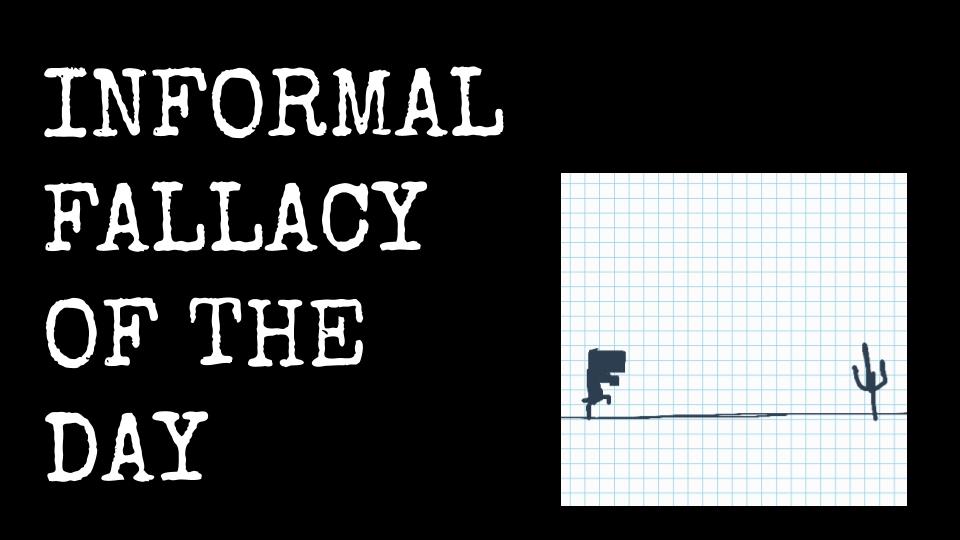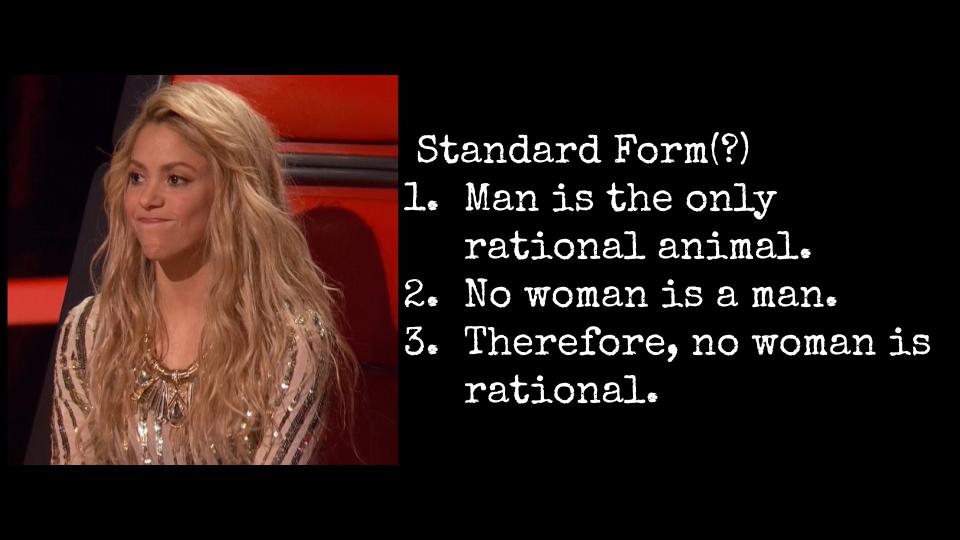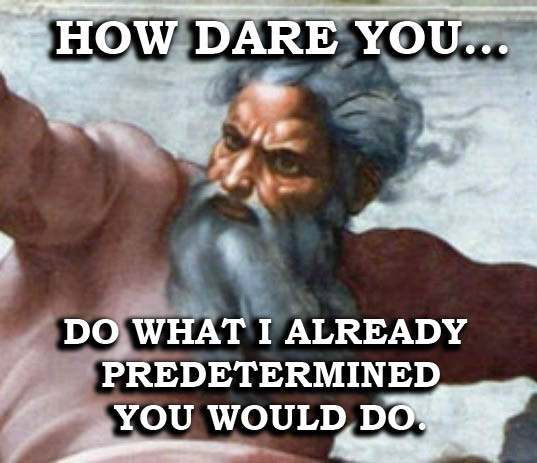The Problem of Evil
Utter trash.
~The Greek intellectual Celsus,
evaluating the Old Testament
An ever-changing dynamic
The relationship between intellectuals and religious faith is a complicated one. Some intellectuals, as will be shown below, had nothing but animosity towards the Christian faith. Others have been tremendously empowered by it and have used it as their motivation for their intellectual breakthroughs. Taking the perspective of the atheist, then, requires some subtle maneuvering. Many atheists consider themselves to be on the side of reason—in an imagined competition between faith and reason. But this will be easier said than done.
Let's begin in the early days of the Christian faith. We'll start in the year 163 CE. The intellectual climate in Antiquity, the label given to the time period which comprises the era of Classical Greece and Rome, is impressive to say the least. The most famous physician of the time period, Galen (129-210 CE), was performing live vivisections of animals (for scientific purposes) which were well-attended and popular. And although the views held by Galen were not strictly-speaking compatible with modern science—for example, he never used control groups—it was nonetheless more empirical than any other previous approaches to medicine. In short, it was progress.
It is also the case that the philosophy of atomism was in full swing. This rich tradition, which began in the 5th century BCE, held that the universe is composed of tiny, indivisible atoms, each having only a few intrinsic properties—like size and shape. Atomist philosophers were seen as competitors to the Aristotelian system, who built their own comprehensive view of the origins of the universe without teleological natural philosophy.
It was even the case that the emperor of the day was a philosopher. This was none other than Marcus Aurelius (121-180 CE), who was deeply committed to Stoicism. Although most Stoic writings are lost to history, from the few surviving texts and commentaries that have survived, we can discern the general view of the Stoics. The basic goal of Stoicism is to live wisely and virtuously. The Greek word used to label this state is arete, a term that is actually best translated not as “virtue” (as it is commonly done) but as “excellence of character.”

Marcus Aurelius.
Something excels, according to this tradition, when it performs its function well. Humans excel when they think clearly and reason well about their lives. To achieve this end, the Stoic develops the cardinal virtues of wisdom, justice, courage, and moderation. The culmination of these virtues is arete, and this is the only intrinsic good, i.e., the only thing that is good for its own sake. External factors, like wealth and social status, are only advantages, not goods in themselves. They have no moral status. They, of course, can be used for bad aims, but the wise mind uses them to achieve arete. For a review of Marcus Aurelius' practice, see Robertson (2019).
It appears that early Christians rejected many of the intellectual movements of their time. For example, the atomists, whose belief system contradicted the notion of life after death, were targeted by early Christians. Apparently the atomist doctrine that human lives were just a “haphazard union of elements” conflicted starkly with the Christian notion of a soul (Nixey 2018: 38). Much later, Augustine was concerned that atomism weakened mankind’s terror of divine punishment and hell (ibid., 39). As such, texts that espoused atomist views, like those of Democritus, were actively denounced or neglected and were eventually lost to the West.
The Stoic movement was also negatively impacted by Christianity. As previously noted, Stoic writings, along with most of the literature of the classical world, are lost, and this process was initiated when Christians took control of the Roman empire in the 4th century CE (Nixey 2018). In fact, only about 10% of classical writings are still in existence. If one narrows the scope only to writings in Latin, it is only about 1% that remains (ibid., 176-177; see also Edward Gibbon's History Of The Decline And Fall Of The Roman Empire, chapters 15 and 16). And so, the Stoic logic that is studied today (in courses like PHIL 106) was actually reconstructed (or "rediscovered") in the 20th century, as modern logicians were formalizing their field (O'Toole and Jennings 2004).1

Celsus.
As the anti-intellectualism of Christianity was becoming evident, thinkers in Antiquity were becoming increasingly suspicious and critical. The Christians shirked military service and instead preached meekness (which must've sounded ludicrous to Roman ears). Later on, the public spending on monks and nuns was believed to have weakened the Roman Empire substantially. Some intellectuals felt the need to cry out.
Celsus was one of these thinkers. He openly mocked the virgin birth and the Christian creation myth. He wondered why Jesus’ teachings contradicted earlier Jewish teachings (Had God changed his mind?) and why God waited so long between creation and salvation (Did he not care prior to sending Jesus?). He also wondered why he sent Jesus to a “backwater” (i.e., Bethlehem) and why he needed to send Jesus at all (Nixey 2018: 36-7). Celsus was most concerned with how willful ignorance, of which he accused the Christians, made you vulnerable to believing in things that are easily dismissed had the person in question been more well-rounded in their reading. He pointed out what many of us today know all too well: people that only get their information from one source are at risk of biased information, disinformation, and believing in things that a little critical thinking could dispel.
“Lack of education, Celsus argued, made listeners vulnerable to dogma. If Christians had read a little more and believed a little less, they might be less likely to think themselves unique. The lightest knowledge of Latin literature, for example, would have brought the interested reader into contact with Ovid’s Metamorphoses. This epic but tongue-in-cheek poem opened with a version of the Creation myth that was so similar to the biblical one that it could hardly fail to make an interested reader question the supposed unique truth of Genesis" (Nixey 2018: 42).2
After Celsus, Porphyry waged an even more thorough attack on Christianity. His attack was so ferocious that his works were completely eradicated, the task being begun by Constantine. Celsus’ works would be lost if it weren’t for the long passages that the Christian Origen quoted during his counterattack.
But then again, almost every major thinker from the early modern period that we've covered so far was a believer; Hume is the sole exception (so far). It's not the case that believing in Christianity necessarily negatively affects your information-processing capacities.
“The mathematicians and scientists of the Renaissance were brought up in a religious world which stressed the universe as the handiwork of God... Copernicus, Brahe, Kepler, Pascal, Galileo, Descartes, Newton, and Leibniz… were in fact orthodox Christians. Indeed the work of the sixteenth, seventeenth, and even some eighteenth-century mathematicians was a religious quest, motivated by religious beliefs, and justified in their minds because their work served this larger purpose. The search for the mathematical laws of nature was an act of devotion. It was the study of the ways and nature of God which would reveal the glory and grandeur of His handiwork” (Kline 1967: 206-7).


The atheist response
We are now going to take a look at the perspective of the atheist. You will soon discover that there are atheist responses to every kind of argument for God's existence. To understand this, however, we must first clarify what the different types of arguments are.3
Once again it is Immanuel Kant who categorizes for us. In the domain of religion, Kant argues that there are only three kinds of argument for God’s existence:
- the ‘cosmological’ category, as in Aquinas’ Argument from Efficient Causes,
- the ‘ontological’ category, as in Anselm’s and Descartes’ ontological arguments,
- and the ‘physico-theological’, also known as arguments from design.
The third category is of interest to us. We've not yet covered an argument of this type. Moreover, Kant, himself a believer, makes the case that this is the type of argument that is best understood by the human intellect. We'll look at one next.
“Kant says of the argument from design [the ‘physico-theological’ type of argument] that it ‘always deserves to be mentioned with respect. It is the oldest, the clearest, and the most consonant with human reason. It enlivens the study of nature, just as it itself derives its existence and gains ever new strength from that source’” (Scruton 2001: 66-7; interpolation is mine).
Argument from
intelligent design
As we mentioned last time, Aquinas provided his Five Ways, five proofs of God's existence. The fifth of these five ways is an argument of the physico-theological type, an argument from intelligent design. Rather than using Aquinas' arguments again, though, I will use a more modern argument. We will look at William Paley's watch analogy.
In the early 19th century, there was a revival of natural theology. Natural theologians, recall, assumed God's existence and sought to discover the grandeur of God's handiwork by studying the natural world. This revival is primarily due to William Paley. Paley advocated natural theology as a method of discovering (and praising) God’s work. It was perceived as an act of devotion. In fact, this is why Charles Darwin’s father, realizing his son’s waning interest in medicine (his first career choice), recommended that Charles take up natural theology instead. (Ironic, isn't it?) See chapter 1 of Wright's (2010) The Moral Animal for a short biography of Darwin which includes this anecdote.
The argument
- The world displays order, function, and design.
- Other things (e.g., watches) display order, function, and design.
- Other things (e.g., watches) that display order, function, and design, do so because they were created by an intelligent designer.
- Therefore, the world displays order, function, and design because it was created by an intelligent creator (and this is God).

Objections
The Regress Problem
If complexity implies that there is a designer, then consider how complex God must be. It seems like God, since He is so complex, also had a designer. In fact, how do we know that God wasn't made by some even more powerful meta-god?
Compatibility with Polytheism
Even if this argument is sound, it does not necessarily prove the existence of a singular God. It’s possible that many gods collaborated to create the universe. In fact, this sort of makes more sense, since most complex enterprises are done by teams and not individuals.
Hume’s Objection
In his Dialogues on Natural Religion, Scottish philosopher David Hume made a comment relevant to this argument (although he had died before the publication of Paley's work). Hume made the point that in order for an analogical argument to work, you have to know the two things you are comparing. That is to say if you are comparing, let's just say, life to a box of chocolates, in order for the comparison to work, you'd have to know both things fairly well. We are, of course, alive. And most of us have had experience with those boxes of assorted chocolates, where some items are very tasty but some are filled with some kind of gross red goo. The box of chocolates takes you by surprise sometimes, just like life. The analogy works because you know both things.
So here's the problem that this poses for the teleological argument: maybe you've seen a watch get made, but you've never seen a universe get created. You're comparing a thing you know (a watch) to a thing you don't understand fully (the universe). So, Hume would say, the analogy doesn't work.
Argument from Ockham’s Razor (Atheist Edition)
The following is an argument made by G.H. Smith in his book The Case Against God. It makes use of Ockham's razor to disarm the argument from intelligent design. Smith argues that the only difference between the view of the natural theologian, who uses empirical observation to try to prove God's existence, and the atheistic natural philosopher, who uses empirical observation to learn about the world, is that the former (the natural theologian) has an extra belief in his/her worldview. The extra belief is, of course, belief in God. But belief in God offers no explanatory power. This is because to posit the supernatural as an explanation for some natural phenomenon explains nothing. Supernatural things are, by definition, beyond natural explanations. Thus, the design argument has zero explanatory power. By Ockham’s Razor, the belief in God is superfluous.
Denying premise #3
Another, more general strategy is to deny that premise #3 is true. If successful, this objection would undermine the soundness of the whole argument. The argument might go like this. First off, we can say that the universe does not display purpose. Even though there are some regularities in the universe (like stable galactic formations and solar systems), none of these have any obvious purpose. What is the purpose of the universe? What is it for? These appear to be questions without answers, at least not definitive ones.

Some atheists (e.g., Firestone 2020) go further and attempt to dispel any notion that the universe might be well-ordered in any way. Firestone argues that the so-called regularities we do observe in the universe only appear to be regularities from our perspective. For example, we know that the early universe, soon after the Big Bang, was very chaotic (Stenger 2008: 121). Further, some parts of the universe are still chaotic (there are galaxies that are crashing into each other, black holes swallowing entire solar systems, etc.). We couldn't see much of that during Paley's time, but to continue to argue that the universe is well-ordered and displays function seems to be anachronistic (or out of sync with the times).
Some theists might respond to the objections above by arguing that some of the universe does have a function. Perhaps the function of our part of the universe is to harbor human life. If this is the argument, then there is a glaring problem with it. We must remind ourselves that human life on this planet is only temporary. This is because life on this planet will be impossible somewhere between 0.9 and 1.5 billion years from now (see Bostrom and Cirkovic 2011: 34). At this point, the sun will begin to enter its red giant phase and expand. It might consume the planet. Or it might simply heat up our planet until complex life is impossible. In either case, harboring human life would not be one of the functions of Earth.
Lastly, even if we agree that there is some kind of order to the universe, this is not the same kind of order that is seen in a watch. Rather, it is merely the sort of patterns you would find in any complex system. That is to say any sufficiently complex systen gives rise to perceived regularities. This is usually referred to as Ramseyian Order (see Graham & Spencer 1990). In other words, this means that Paley is guilty of an informal fallacy; he used the word "order" with two different meanings (see Firestone 2020).

Equivocation is a fallacy in which an arguer uses a word with a particular meaning in one premise, and then uses the same word with a different meaning in another premise. For example, in the argument below, the word "man" is used in two different senses. In premise 1, "man" is (in sexist language) being used to refer to the human species. In premise 2, "man" is being used to refer to the male gender. Not cool, fam. Not cool.



Important Concepts
Atheists on the attack
The traditional approach that atheists take when critiquing belief in the Judeo-Christian God is to show how the very descriptions and traits ascribed to God render the whole notion of God incoherent. There are, of course, other ways to argue against God's existence, but, in this course, we'll focus on the method just described.4
The Problem of Divine Foreknowledge
The problem of divine foreknowledge is one such problem. This problem arises when one reflects on the apparent incompatibility between God's omniscience and human free will. If God knows everything that there is to be known, then God knows every single choice you will ever take. To God, your entire life is like a book; God already knows how everything is going to turn out. As such, your life seems like it is set; it is written, it cannot change. If this is the case, then you don't enjoy real freedom; if your path is already determined, then you don't really have free will. It seems that your life is already determined; your fate is sealed.

Meme from internet,
grammatical error
in original.
This problem gets even more troublesome when you realize that, in the Christian worldview, there is an existence after your earthly death—either eternal bliss in heaven or endless punishment in hell. But God already knows where you'll end up. So, it might be that some of us end up in hell, tortured for all eternity, but that we never exercised any free will to deserve being there. In other words, it seems that God punishes those who can't help but to have behaved in the way that they did, and this seems really unfair.
The Omnipotence Paradox
The attribute of omnipotence is itself probably incoherent. For example, can God make a boulder so big that God can't move it afterwards? If God can't, then God is not all powerful, since God can't make it; if God can, God is not all-powerful since God can't move it. Here's another one: can God make beings such that, afterward, God can't control them? There are numerous other examples. Two is enough.
The Question of Miracles
Miracles occur when God bends the laws of nature. But why does God need to bend the laws of nature? Didn't God set everything in motion? Why didn't God plan everything correctly from the beginning? Did God make a mistake? Did God have a change of heart? Why would miracles be necessary for a being that is omniscient?

The Problem of Evil
The preceding problems each reflect on one of the attributes ascribed to God and argues that it conflicts with our commonsense intuitions about the world, about humans, or about the attributes ascribed to God. The Problem of Evil (PoE), however, utilizes all of the attributes ascribed to God in order to mount a powerful argument against God's existence...
Context
To understand this argument, we need to first grant an assumption: there exists unnecessary suffering in the world. To me, there's hardly a better example of unnecessary suffering than the world wars that the Great Powers dragged the rest of the world into during the 20th century. These included the deaths of millions, starvation, exposure to the elements, grotesque injuries, genocide, etc. The horrors of World War I (WWI) will be relevant later in this course, so I will now give some details.
WWI was caused by a series of alliances of and arm races by the European powers, as well as a German nation that felt it could not exercise its imperial power since the other imperialist powers had already colonized much of the world. Moreover, Germany felt increasingly surrounded by its rivals. And so, Germany felt that a war against France and Russia could bolster its status as a regional power and grant it some colonies. All powers that eventually became involved thought it'd be a short war—the generals believed the soldiers would be "home before the leaves fall." They were wrong.
Seven reasons why WWI was pointless and full of unnecessary suffering:5

A soldier with shell shock.
Military uniforms were horribly outdated. For example, the French high command structure refused to trade in their traditional, easily-spotted red pants for newer, more camouflaged colors like field gray. One commander even said, “Le pantalon rouge c'est la France.” [The red pants are France.] Clearly, these colored pants simply painted a target on French soldiers and is a completely senseless policy.
Soldiers had insufficiently protective head gear. The Germans, for example, introduced the steel helmet only in early 1916, after almost two years of fighting. Countless deaths could be attributed to this shortsighted policy alone.
Even though some thinkers believed that the economic cost of war was so great that it would be irrational to engage in conflict, like Norman Angell did in his influential The Great Illusion (first published in 1909), the Great Powers nonetheless continued their arms race. This made war all but inevitable as well as irrational. In the end, nations were bankrupted, empires fell, and millions were dead.
The French had known about the German plan of attack, the Schlieffen Plan, through their intelligence channels. But they simply didn’t believe it, and later thought it would workout to their favor. They were wrong. They could've stopped Germany earlier, but they didn't.
Highly ranked officers in the Russian army, on whom which the French and British relied on to attack Germany from the East, willfully ignored learning modern war tactics and were proud of it. This led to the continued deployment of the frontlines to charge machine guns. This is might've worked with older weaponry, but not with the mechanized warfare of WWI. Soldiers were slaughtered as they charged machine guns. Completely inexcusable.
Although WWI was referred to as the “war to end all wars”, it really was classic imperialism in disguise. The Allies, for example, were making private deals with countries that could help them win the war, such as Italy, while making public proclamations about how people have the right of self-determination. The most glaring example of this was the Sykes-Picot agreement. Per this agreement, after the Allies won, the Ottoman Empire was to be broken up and distributed among the allied victors. The same month that this was being negotiated, the British government made a public declaration guaranteeing a national home for Jewish people in Palestine, which was part of the Ottoman Empire. Britain primarily wanted this home for Jewish people to extend its sphere of influence. And none of this would’ve been known if it weren’t for the Bolsheviks. Weeks after taking power, the Bolsheviks divulged the details of the Sykes-Picot agreement, showing that the Great Powers were engaging in imperialism, business as usual.
WWI was the final straw that broke the Romanov Dynasty in Russia. A few months after the collapse of this regime the Bolshevik Communists took over, initiating one of the most awful political experiments in the history of civilization. Even if the only effect of WWI was that the Bolsheviks gave rise to the Soviet Union, the excess mortality in the Soviet Union during Stalin's reign was 20 million. In other words, Stalin caused as many deaths as WWI and it was in large part WWI that allowed Stalin's party to take power.
The result:
About 20 million people died in WWI.


To be continued...
FYI
Suggested Reading: John Mackie, Evil and Omnipotence
TL;DR: Crash Course, The Problem of Evil
Supplementary Material—
-
Video: Bart Ehrman, God and the Problem of Suffering
-
Note. Bart Ehrman is a biblical scholar. His personal website is here.
-
Related Material—
-
Reading: Burt Solomon, The Tragic Futility of World War I
-
Reading: Brian Frydenborg, The Urgent Lessons of World War I
Advanced Material—
-
Reading: Marilyn McCord Adams, Horrendous Evils and the Goodness of God
-
Reading: Jeff Speaks, Speaks on Mackie
-
Reading: Peter Van Inwagen, The Problem of Evil
-
Note: This is a series of lectures for the interested student. Most relevant to the course is Lecture I.
-
- Reading: Randy Firestone, Paley’s version of the Teleological Argument is Based on an Equivocation Fallacy: There is No Order in the Universe Which Resembles the Order of a Watch
Footnotes
1. Gibbon’s Decline and Fall of the Roman Empire was placed in the Vatican’s Index Librorum Prohibitorum, i.e., the "List of Prohibited Books".
2. Of course, an educated Christian would’ve also been able to tell that there were several other people preaching that they were the messiah, claiming divinity and living a life of renunciation. Several even claimed that they had to die for the sake of humanity and had followers who claimed they resurrected after their death. One such case was that of Peregrinus, whose biography mirrors that of Jesus of Nazareth to an alarming degree. In any case, educated Christians would not have known about Peregrinus for long. A book by Lucian describing the tale of Peregrinus was also banned by the Church. The Church dealt with pagan messiahs whose life was similar to that of Jesus so often that there's a term for it: diabolical mimicry.
3. A note on the label "atheist": It is not universally agreed upon what the label "atheist" actually means. Does it mean an active denial of the Judeo-Christian God's existence or is it merely non-belief? In this class, I will refer to the individual who actively denies the existence of some deity as an atheist and someone who just has no beliefs about deities as a non-theist; someone who believes in God is a theist. As for the agnostics, I won't define that category in a loose "spiritual" sense like some of my students have in the past. In this class, an agnostic is someone for whom knowledge of the supernatural is impossible; a gnostic is someone who believes knowledge of the supernatural is possible. According to this nomenclature, one can actually combine positions. One can be either a theist, atheist, or non-theist as well as either a gnostic or agnostic. For example, Ockham is a theist agnostic, who believed in God but thought that knowledge of God was impossible. Aquinas was a theist gnostic, who believed in God and thought he could have knowledge of this existence. In this class, we will cover the position of the gnostic atheist: the person who actively denies the existence of the Judeo-Christian God and who believes they know that this supernatural being does not exist.
4. Another strategy used to argue against God's existence is sometimes referred to as "debunking". The general idea here is to tell the history of some religion, for example, Christianity, and then argue that there is nothing divine or supernatural about this belief system. So, there is the deductive approach which seeks to undermine the intelligibility of the notion of God and the historical inductive approach which undermines confidence in religious beliefs by explaining the phenomenon in purely natural terms. We will be using the first approach, i.e., the deductive approach, in this class.
5. For more on 1914, see Barbara Tuchman's The Guns of August. For a history of the imperial powers in the Arabian peninsula, see chapter 13 of Mackintosh-Smith (2019). Mackintosh-Smith has this to say about the Sykes-Picot agreement: “Some commentators have argued that their pact... ‘was a tool of unification, rather than the divisive instrument it is now commonly thought to have been.’ That is sophistry. The agreement did, in fact, accept the principle of eventual Arab independence, but on condition of the two powers having permanent influence. A prisoner is not free just because he is under house arrest instead of in jail” (Mackintosh-Smith 2019: 442-443).

